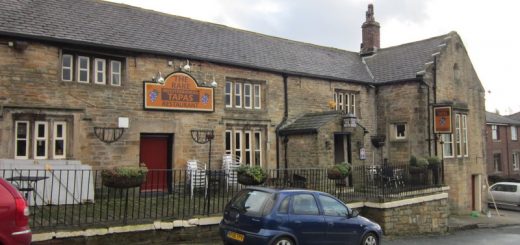Mary Blandy’s Execution, Oxford
Mary Blandy was executed on 6 April 1752 for the muder of her father Francis Blandy in Henley on Thames. The location of Mary Blandy’s execution was either the Westgate prison mound or in the Castle Yard in Oxford, both of which are very close to each other. According to folklore a blackbird was perched on the gallows during her execution and from that date no blackbird has been heard to sing in that vicinity. It is also suggested that the ghost of Mary Blandy has been seen behind the Westgate shopping centre, where the prison mound is thought to have been.
The following is a contemporary account of the execution which appeared as Appendix VII of William Roughead’s ‘Trial of Mary Blandy’ (1914).
 ‘She was attended daily by the Rev. Mr. Swinton, before whom, there is no doubt, she behaved properly (though in his absence seemed not under the least concern) as appears From Mr. Swinton, himself, whose veracity I don’t in the least scruple, who has at various times declared, that whenever he was with Miss Blandy after her condemnation, she behaved in a becoming manner for a person under such circumstances; but I am afraid she had too much art for that gentleman, and that he was rather too credulous, and often imposed upon by her; she made him believe, ’tis certain, that after her mother’s death, her apparition frequently appear’d; that there was musick hoard in the house night and day; yet all the performers were invisible. The reader will be surprised that stories of this kind should prevail at this time of day, and still more so, that Mr. Swinton should listen to them; but I am well informed that this gentleman himself is apt, to give credit to things of this sort.
‘She was attended daily by the Rev. Mr. Swinton, before whom, there is no doubt, she behaved properly (though in his absence seemed not under the least concern) as appears From Mr. Swinton, himself, whose veracity I don’t in the least scruple, who has at various times declared, that whenever he was with Miss Blandy after her condemnation, she behaved in a becoming manner for a person under such circumstances; but I am afraid she had too much art for that gentleman, and that he was rather too credulous, and often imposed upon by her; she made him believe, ’tis certain, that after her mother’s death, her apparition frequently appear’d; that there was musick hoard in the house night and day; yet all the performers were invisible. The reader will be surprised that stories of this kind should prevail at this time of day, and still more so, that Mr. Swinton should listen to them; but I am well informed that this gentleman himself is apt, to give credit to things of this sort.
Some days before her execution, she said that she intended to speak at the tree, if she had spirits when she came there, but that she was afraid the sudden shock of seeing the gallows might be too much for her to withstand, and that her spirits might fail her, unless she had an opportunity of seeing it beforehand, which she did, as the reader will find hereafter.
We are now arrived at the verge of this unfortunate’s life; the day before her execution she receiv’d the Holy Sacrament of the Lord’s Supper, and sign’d and deliver’d the following paper, in order to convince the world how much she had been imposed on and seduc’d.
I, Mary Blandy, do declare, that I die in a full persuasion of the truth and excellency of the Christian religion, and a sincere, though unworthy, member of the Church of England. I do likewise hope for a pardon and remission of my sins, by the mercy of God, through the merits and mediation of Jesus Christ, my most blessed Lord and Saviour. I do also further declare, that I did not know or believe that the powder, to which the death of my dear father has been ascribed, had any noxious or poisonous quality lodged in it; and that I had no intention to hurt, and much less to destroy him, by giving him that powder; All this is true, as I hope for eternal salvation, and mercy from Almighty God, in whose most awful and immediate presence I must soon appear. I die in perfect peace and charity with all mankind, and do from the bottom of my soul forgive all my enemies, and particularly those who have in any manner contributed to, or been instrumental in bringing me to the ignominous death I am so soon to suffer. This is my last declaration, as to the points therein contained; and I do most earnestly desire, that it may be published after my decease. Witness my hand, MARY BLANDY.
It has been before intimated that Miss often declared to the Rev. Mr. Swinton that since the death of her mother she had frequently in the night, and sometimes in the day been entertained with musick, performed, as she imagined, by invisible spirits; and since her conviction, has often been amused in the same manner; but in the night before her execution, the musick was more heavenly than ever she had heard it before; and this she declared in the morning before she was executed.
As a report had been universally spread that she would be executed on the Friday before, a very great concourse of people were got together upon the Castle Green, to be spectators of the execution. Miss went up several times into the room facing the Green, where she could view the great crowd of people about it; which she did with all the calmness and unconcern imaginable; and only said that she would not balk their expectations, tho’ her execution might be deferred a day or two longer.
 About ten o’clock on Sunday night, being informed that the Sheriff was come to town, she sent a messenger to him, to request that she might not be disturbed till right in the morning, and that as soon after as he pleased she would be ready for the great task she had to undergo. Accordingly, about half an hour after eight, the Sheriff, with her attorney, and the Rev. Mr. Swinton, went to the Goal, and after half an hour’s private prayers with the clergyman, she came down into the Goal yard, where the Sheriff’s men were, and held two guineas in her hands for the executioner, which she took with her to the fatal tree.
About ten o’clock on Sunday night, being informed that the Sheriff was come to town, she sent a messenger to him, to request that she might not be disturbed till right in the morning, and that as soon after as he pleased she would be ready for the great task she had to undergo. Accordingly, about half an hour after eight, the Sheriff, with her attorney, and the Rev. Mr. Swinton, went to the Goal, and after half an hour’s private prayers with the clergyman, she came down into the Goal yard, where the Sheriff’s men were, and held two guineas in her hands for the executioner, which she took with her to the fatal tree.
The night before her execution, she spent the chief of her time in prayers. She went to bed about the usual hour, and had little rest in the fore part of the night, but was at prayers in bed between three and four o’clock; after ending of which, she got up and dress’d herself; and some time after this, went up into the upper rooms of the house to look upon the gallows, which is opposite the door of the goal, and made by laying a poll across upon the arms of two trees, when she observed that it was very high. She went out of the Castle about nine o’clock, attended by the Rev. Mr. Swinton, dress’d in a black crape sack, with her arms and hands ty’d with black paduasoy ribbons, and her whole dress extremely neat; her countenance was solemn, and her behaviour well suited to her deplorable circumstances; but she bore up under her misfortunes with amazing fortitude.
When she came to the gallows Mr. Swinton read several select prayers suitable to the occasion, and then asked her if she had anything to say to the populace? to which she answered, yes. She then begged the prayers of all the spectators, and declared herself guilty of administering the powder to her father, but without knowing that it had the least poisonous quality in it, or intending to do him any injury, as she hoped to meet with mercy at that great Tribunal before whom she should very shortly appear. And as it had likewise been rumoured that she was instrumental in the death of her mother in like manner as her father, and also of Mrs. Pocock, she declared herself not even the innocent cause of either of their deaths (if she was the innocent cause of that of her father) as she hoped for salvation in a future state.
As she ascended the ladder, after she had got _up_ about five steps, she said, “Gentlemen, do not hang me high, for the sake of decency;” and then being desired to step up a little higher, she did two stops, and then turning herself about, she trembled, and said, “I am afraid I shall fall.” After this, the halter was put about her neck, and she pulled down her handkerchief over her face, without shedding one tear all the time. In this manner she prayed a little while upon the ladder, then gave the signal, by holding out a little book which she had in her hands. There was not a large concourse of people at the execution, but the most thinking part of them were so affected with her behaviour and deplorable circumstances, that they were in tears. After hanging above half an hour the Sheriff gave orders for her being cut down. Thus far the utmost decorum was observed, but for want of some proper person to take care of her body, this melancholy scene became still more shocking to human nature. There was neither coffin to put her body in, nor hearse to carry it away; nor was it taken back into the Castle, which was only a few yards, but upon being cut down was carried through the crowd upon the shoulders of one of the Sheriff’s men in the most beastly manner, with her legs exposed very indecently for several hundred yards, and then deposited in the Sheriff’s man’s house, ’till about half an hour past five o’clock, when the body was put in a hearse, and carried to Henley, where she was interred about one o’clock the next morning in the church, between her father and mother, where was assembled the greatest concourse of people ever known upon such an occasion. The funeral service was performed by the same clergyman as wrote the letter, dated the 7th of March to whom, among seven guineas which she left for seven rings, she bequeathed one of them.




Recent Comments